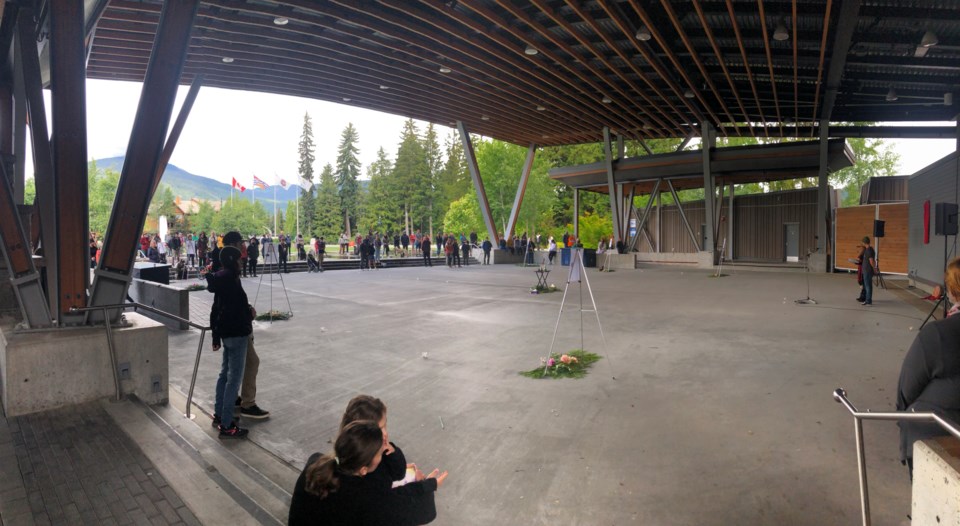In recent years, it seems like Whistler’s community has been speaking out in the name of social justice more than ever.
Last fall, hundreds showed up to a climate march, while earlier this month, hundreds again attended a Black Lives Matter rally in the wake of George Floyd’s death.
Every time I’ve attended one of these events I’ve felt my heart start to swell just a little with pride for this community I’ve come to call home.
Time and time again, Whistler’s proved that when there’s something that really matters to us, we show up.
That’s probably why I felt a small tinge of disappointment alongside the typical warm fuzzies when I showed up to Whistler Olympic Plaza to cover a vigil marking National Indigenous Peoples day on June 21. The event also honoured eight Indigenous Canadians who have died in police incidents in recent weeks.
Instead of a crowd of hundreds, the people gathered under the Plaza’s overhang—practising physical distancing without even having to try—could be counted in the tens. There were no RCMP representatives, or anyone from either of the First Nations on whose shared territory Whistler was built.
I’m in no way trying to guilt or shame anyone who didn’t make it—just trying to make sense of my feelings about it. Part of my discomfort stems from the fact that some social movements, like climate strikes or Black Lives Matter, have occupied pretty prominent territory in the social conversation that Indigenous issues arguably haven’t.
I’m not taking away from the significance of those issues, either—they deserve every ounce of attention they get and more—or insinuating that people in Whistler don’t care about First Nations.
But while celebrities and influencers document protests and share “swipe-up” links to donate to organizations, I haven’t seen the systemic racism our country’s Indigenous people experience receiving the same treatment. Considering the discrepancy in turnouts between Whistler’s protests, it makes me question if the trendiness of a particular issue impacts how strongly people care about it.
I guess my discomfort with the small crowd was mostly born from my own guilt. Growing up in suburban Ottawa, my interactions with Indigenous people and culture were limited.
I remember building longhouses and totem poles out of play-dough in elementary school. In high school, we learned about Louis Riel, the Manitoban Métis leader who led rebellions against the Canadian government. I was so confused about why another nearby high school was named after him, if he was a criminal who was executed for treason. Most clearly, I remember the first-year university classroom where I learned what a residential school was.
There could have been a mention of residential schools in our history textbook that I’m forgetting, but there’s no chance my Catholic high school fully exposed us to the horrors of what went on within their walls, largely at the hands of the same church we were expected to believe in. There was never any acknowledging that we were on anyone’s traditional unceded territory before announcements or assemblies.
I remember sitting in that university class, stunned that no one had ever thought to tell me our country had done something so horrible. My jaw dropped a few inches lower when our professor informed us that the last residential school closed in 1996. I couldn’t, and still can’t wrap my head around the fact that something so obviously racist happened during my lifetime.
As I learned more about residential schools and engrained racism over the next four years, my mind was blown with every fact and story I heard. I felt, and still feel, like there’s more I need to be doing to make up for this, but don’t know where to start.
Even now, as someone who likes to consider myself at least a little more knowledgeable about social issues than I was at 18, I’m still learning. I’m uncomfortable admitting it, but this was the first year I’d heard about National Indigenous Peoples Day.
That said, Whistler is incredibly progressive when it comes to Indigenous relations, by most standards.
The visibility of our local First Nations was already something that pleasantly surprised me when I first landed in town. Now, Whistler’s new Official Community Plan, adopted on June 23, contains historical contexts written by the Lil’wat and Squamish Nations and a chapter dedicated to reconciliation with both, and will also result in more development opportunities and enhanced visibility for both Nations.
I can’t commend council enough for taking these unprecedented steps, but that progress doesn’t mean this town and those who live here can’t keep learning.
It’s hard to forget the overwhelming guilt I felt when I first realized that my country wasn’t necessarily mine. While we can’t change the past, the least we can do (on Canada Day, nonetheless) is to show up, reflect on what more we can do as individuals and as a community to learn, make reparations and better support the peoples who called this incredible country home long before our relatives arrived and took it from them.




